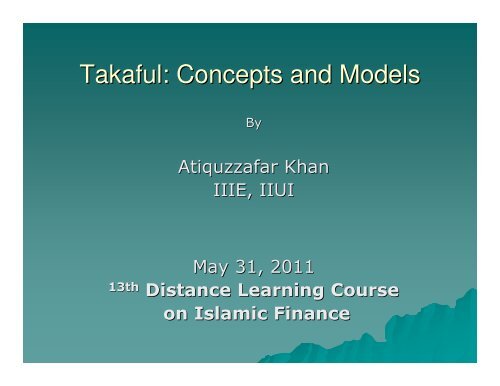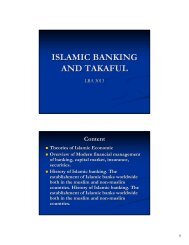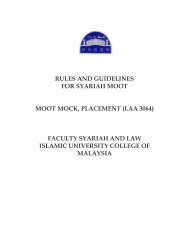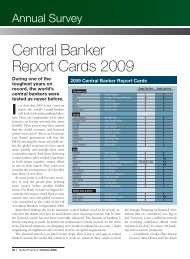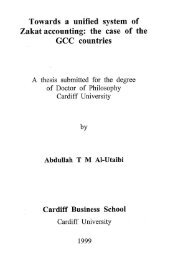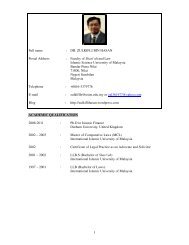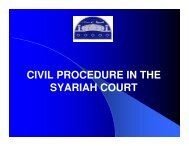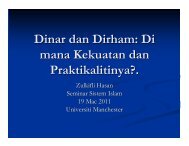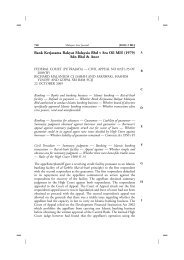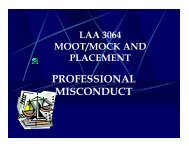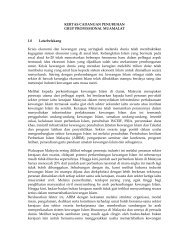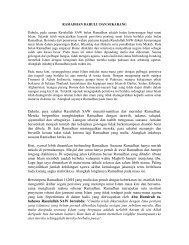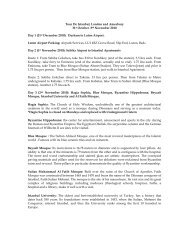Takaful: Concept and Model by Atiquzzafar Khan
Takaful: Concept and Model by Atiquzzafar Khan
Takaful: Concept and Model by Atiquzzafar Khan
- No tags were found...
Create successful ePaper yourself
Turn your PDF publications into a flip-book with our unique Google optimized e-Paper software.
<strong>Takaful</strong>: <strong>Concept</strong>s <strong>and</strong> <strong>Model</strong>sBy<strong>Atiquzzafar</strong> <strong>Khan</strong>IIIE, IIUIMay 31, 201113th Distance Learning Courseon Islamic Finance
Main Topics• Introduction of Modern Insurance• Evaluation of Insurance Businessfrom Islamic Point of View• Islamic Alternative: (Review ofExisting Experiences of <strong>Takaful</strong>)• Performance of <strong>Takaful</strong> Industry
Risk <strong>and</strong> Insurance:Risk <strong>and</strong> uncertainty are fundamentalfacts of life. All human activities aresubject to risk, which may lead tofinancial or physical losses to him.Insurance is a device to cover thelosses arise due to occurrence ofsome undesired event.
Definition of InsuranceInsurance is an economic devicewhere<strong>by</strong> the individual substitutesa small certain cost (premium) fora large uncertain financial loss(the contingency insured against)that would exist if it were not forthe insurance.
Socio-Economic Benefits of InsuranceRisk CoverageHabit of ThriftSafe <strong>and</strong> Profitable InvestmentSecure working environment forBusinessesPlanning for life stage needsCapital formation in the Economy
Nature of Insurance ContractGeneral InsurancePremiumCompensationPremiumLife InsuranceCompensation
Shariah Position of InsuranceOpinion of Shariah scholars is dividedon insurance. We can classify theminto three major groups.– Those who consider both theconcept <strong>and</strong> practice of commercialinsurance un-Islamic.– Those who are in agreement withthe present insurance <strong>and</strong> findnothing wrong in it.– Those who accept the concept ofinsurance, but find prohibitedelements in its present practice.
Rulings of Collective FiqhiBodies about Insurance– Islamic Research Institute of Al-AzharAzharUni.– Council of Gr<strong>and</strong> Ulama of Saudi Arabia– Majlis Tahqiqat-e-Shari'yah Lucknow,India– Islamic Fiqh Academy of Rabita al-Aa'lam-e-Islami– Al Majma’ Al-Fiqhi Al- Islami of OIC– Council of Islamic Ideology, Pakistan
Major Arguments AgainstInsuranceAccording to these Fiqhi bodies ConventionalInsurance is unlawful because of involvement ofprohibited elements like,– Riba (Interest)– Qimar (Gambling)– Gharar (Uncertainty, Doubt, Risk)– Unlawful appropriation of others’ property– Violation of law of inheritance in case of life insurance.
Islamic Substitute These Fiqhi bodies suggested that that anscheme based on the concept of mutualcooperation <strong>and</strong> Joint responsibility maybe considered as Islamic Substitute forconventional Insurance. That alternate is introduced under thetitle of <strong>Takaful</strong> in the recent past.
<strong>Takaful</strong> Pioneers <strong>Takaful</strong> started some 30 years ago in Sudan<strong>and</strong> Middle East in 1979 with theestablishement of:– The Islamic Arab Insurance Co. (IAIC) in theUAE <strong>and</strong>– The Islamic Insurance Co. of Sudan But it took some time for the movement totake shape.
<strong>Takaful</strong> Pioneers Later in 1984, Malaysia played a pioneeringrole in setting the first Legal frameworkspecific to <strong>Takaful</strong> (<strong>Takaful</strong> Act Malaysia). This was instrumental in the successfullaunching of the <strong>Takaful</strong> movement inMalaysia <strong>and</strong> in other countries of SouthEast Asia.
Other Islamic/ <strong>Takaful</strong> Legislations Other markets such as the Sudan<strong>and</strong> Iran have Islamic regulatoryenvironments <strong>and</strong> became naturally<strong>Takaful</strong> markets. In Pakistan <strong>Takaful</strong> Act is enforced in2005 <strong>and</strong> Pak-Kauwait <strong>Takaful</strong> Co.started its operation. In the Gulf countries specific <strong>Takaful</strong>legislations are coming through inBahrain <strong>and</strong> in Saudi Arabia
<strong>Takaful</strong> Today From a h<strong>and</strong>ful of operators two decadesago the <strong>Takaful</strong> movement has blossomedinto a fast growing phenomenon in manyMuslim countries with very promisingprospects in other countries with a largeMuslim community.
<strong>Takaful</strong> driversThis movement is driven <strong>by</strong>–a a strong dem<strong>and</strong> from a publicwho would not insureotherwise (because of religiousbeliefs); <strong>and</strong>–The successful development ofIslamic banking institutionsproviding capital <strong>and</strong> Islamicfinancial instruments for assetmanagement <strong>and</strong> investment.
<strong>Takaful</strong> Drivers Islamic banks <strong>and</strong> financialinstitutions play a strategic <strong>and</strong>important role in the distributionof <strong>Takaful</strong> products (especiallyLife <strong>Takaful</strong> Products). Just as Bancassurance played animportant role in the distributionof personal lines insuranceproducts Bancatakaful is animportant driver for <strong>Takaful</strong>.
<strong>Takaful</strong> OperatorsThe number of <strong>Takaful</strong> operatorsworldwide is now estimated at: 150 <strong>Takaful</strong> companies operating in40 countries 10 Retakaful companies 6 Islamic windows <strong>by</strong> ConventionalReinsurance companies
<strong>Takaful</strong> Premium <strong>Takaful</strong> is one of the fastest growingsegments in insurance (at around20% pa. on average) World <strong>Takaful</strong> contributions areconservatively estimated at aroundUS$ 10 billion, of which:– 60% General <strong>Takaful</strong>– 40% Family <strong>Takaful</strong>
<strong>Takaful</strong> Geographical SpreadSouth& East Asia : 56%Middle East : 36% Africa: 7% Europe, USA & Others: 1%
Definition of <strong>Takaful</strong>The word <strong>Takaful</strong> means joint guarantee. The objectiveof <strong>Takaful</strong> is cooperation <strong>and</strong> mutual help among themembers of a defined group.In a practical sense <strong>Takaful</strong> can be visualized as amethod of joint guarantee among a group of members orparticipants against loss or damage that may inflict uponany of them. The members of the group agree toguarantee jointly that should any of them suffer acatastrophe or disaster, he would receive certain sum ofmoney to meet the loss or damage. All members of thegroup pool together their efforts to support the needy.
WORKING OF THE TAKAFULBUSINESS: The Malaysian Case <strong>Takaful</strong> Business is based on the concepts ofMudarabah <strong>and</strong> Tabarru. Involvement ofthese two Islamic forms of business eliminatesthe elements of Riba from insurance contract<strong>and</strong> convert Gharar into tolerable form. In Family <strong>Takaful</strong> each <strong>Takaful</strong> installment isdivided <strong>and</strong> credited into two separateAccounts namely, the Participants'Account(PA) <strong>and</strong> the Participants’ SpecialAccount(PSA). A substantial proportion of theinstallments is credited into the PA solely forthe purpose of savings <strong>and</strong> investment.
The balance of the installments is credited intothe PSA as `tabarru' for Sharikah <strong>Takaful</strong>Malaysia to pay the <strong>Takaful</strong> benefits to theheir(s) of any participant who may die beforethe maturity of the contract. The amount accumulated in the PA is investedin various business according to Islamicfinancing techniques, <strong>and</strong> the resultant profitsare divided between the company <strong>and</strong> theparticipants according to the agreed upon ratio,e.g., 30-70. The participant's share is calculated accordingto their individual share in the PA, <strong>and</strong> creditedinto their respective accounts, the PA <strong>and</strong> thePSA.
Mudarabah <strong>Model</strong>Family <strong>Takaful</strong>Profit AttributedTo ShareholdersCompanyShare ofProfit onS.H. capitalShare ofProfit forMudaribCompany’s Admin& Manag. Expenses<strong>Takaful</strong> Contractbased on MudarabahInvestmentProfitParticipantPAFTFPAPayment toThe Family fromPA & PSAPSAPSACost of Re-takafulAnd Other DirectBusiness Expenses
Payment of claimsShould the Participant die or sufferPermanent <strong>and</strong> Total Disability in the fifthyear of participation, <strong>Takaful</strong> benefit willbe paid in the following manner:- i. From Participant's Account =RM 4,890(RM978 x 5)profit if any, say RM 400 ii. From Participants Special RM 5,000Accounts (RM1000 x 5) Total <strong>Takaful</strong> Benefit Payable RM 10,290
In case the Partcipant survivedShould the Participant survive untilthe maturity of his FTP, payment of<strong>Takaful</strong> benefit will be made to himas follows:-i. From his Participant's Account = RM 9,780(RM978 x 10)profit from investment RM 1,800ii. From Participants SpecialRM XXXXAccountTotal <strong>Takaful</strong> Benefit = RM 11,580 +surplus determined<strong>by</strong> Sharikah <strong>Takaful</strong>.
Mudarabah <strong>Model</strong>General <strong>Takaful</strong><strong>Takaful</strong>OperatorShare of profitOn S.H. CapitalShare of SurplusFor the OperatorAdministration& ManagementExpansesProfit forShareholders<strong>Takaful</strong>ContractOn MudarabaBasisInvestmentProfit40%Participant4 contributionGTFGTFOperationalCost Of<strong>Takaful</strong>Surplus60%Share of Surplus forThe Participants
Shariah Concerns regarding Mudaraba <strong>Model</strong>Mudaraba is a commercial contract, hence not suitable for adonation (Tabarru) based scheme.Donation given <strong>by</strong> the participants can not become capitalfor Mudaraba at the same time.Distribution of surplus among the participants in proportionof their contributions is like a conditional gift(Hiba bis-Sawab) which is not allowed.Sharing of surplus in case of General <strong>Takaful</strong>(instead ofprofit) makes the contract essentially the same asconventional insurance contract.Provision of Qard-e-Hasan from the Share holders fund incase of deficit is not correct as Mudarib is not a guarantor.
Wakalah <strong>Model</strong>Family <strong>Takaful</strong>Profit AttributedTo ShareholdersCompanyWakalah Fee25 to 35 %Share ofProfit onS.H. capitalShare ofProfit forMudaribCompany’s Admin& Manag. Expenses<strong>Takaful</strong> Contractbased on WakalahInvestmentProfitParticipantPSAFTFPSAPayment toThe Family fromPA & PSAPA65 to75%PACost of Re-takafulAnd Other DirectBusiness Expenses
Wakalah <strong>Model</strong>General <strong>Takaful</strong>COMPANYTAKAFUL ADMIN & MARKETINGEXPENSES 25% TO 35%SHARE OF PROFITFOR THE COMPANYMANAGEMENTEXPENSES OFCOMPANYPROFIT / LOSSATTRIBUTABLE TOSHAREHOLDERSTAKAFULCONTRACT BASEDON PRINCIPLE OFAL-WAKALAHINVESTMENTBY FUND40%PROFITS FROMINVESTMENT60%PARTICIPANTTAKAFULCONTRIBUTION PAID BYPARTICIPANTGENERALTAKAFULFUND65% TO 75%GENERALTAKAFULFUNDOPERATIONAL COSTOF TAKAFUL /RETAKAFULOPERATIONAL COSTOF TAKAFULOPERATIONAL COSTOF TAKAFULSURPLUS(PROFIT)SHARE OFSURPLUS FORTHE PARTICIPANT100%
Shariah Concerns regarding Wakalah <strong>Model</strong>Wakalah model is free from many objections raised againstMudaraba model but some shariah concerns are still therewhich are as follows:Distribution of surplus among the participants in proportionof their contributions is like a conditional gift(Hiba bis-Sawab) which is not allowed.Provision of Qard-e-Hasan from the Share holders fund incase of deficit is not correct as Wakeel is not a guarantor.
Waqf <strong>Model</strong>
Definition of Waqf Waqf is an Arabic word <strong>and</strong> it meansto stop to withhold <strong>and</strong> not to let go. In technical meaning Waqf means toallocate or donate some property orcash for a specific purpose to getpleasure of Allah <strong>and</strong> not to let it gothrough consumption or sale. The Waqf property comes intoownership of Allah (SWT) <strong>and</strong> Waqifwill have no property rights on it.
Cont… Waqif has right to set the rules for waqf<strong>and</strong> manage the waqf. Waqf may be general purpose or specificpurpose, like Waqf ‘Ala al Aulad orWaqf ‘Ala al Aqarib. In Islamic Law Waqf is a legal entity
Waqf <strong>Model</strong>COMPANYTAKAFUL OPERATOR FEES FORADMIN & MARKETING EXPENSES25% TO 35%SHARE OF PROFITFOR THE COMPANYMANAGEMENTEXPENSES OFCOMPANYPROFIT / LOSSATTRIBUTABLE TOSHAREHOLDERS40%INITIAL DONATION BYSHAREHOLDERS TOCREATE WAQF FUNDPROFIT SHARING ONMUDARABHA BASESWaqfWaqfINVESTMENTBY FUNDPROFITS FROMINVESTMENTTAKAFULCONTRACT BASEDON PRINCIPLE OFAL-WAKALAHPARTICIPANTTAKAFULCONTRIBUTIONPAID BYPARTICIPANTWAQF FUND65% TO 75%60%WAQF FUNDOPERATIONAL COST OFTAKAFUL /RETAKAFULOPERATIONAL COST OFTAKAFULSURPLUS(PROFIT)SHARE OFSURPLUS FORTHE PARTICIPANTOPERATIONAL COST OFTAKAFUL100%
A Waqf Fund would basically be aseparate legal entity to which theShareholders would initially make adonation to establish the Waqf Fund. The donation can be of any reasonableamount (Shariah Board may specify suchan amount). The objectives of the Waqf fund would beto provide relief to participants againstdefined losses as per the rules of theWaqf fund.
Cont….In this modified Wakala <strong>Model</strong> with Waqf, therelationship of the participants <strong>and</strong> of theoperator is directly with the Waqf fund. TheOperator is the Wakeel of the Waqf Fund <strong>and</strong>the participants pay one sided donation tothe WAQF fund (not conditional) which alsoeliminates the issue of Gharar. The WAQFfund rules may define the sharing of surplus<strong>and</strong> other rules under which it would operatebut there is no obligation to distributesurplus. Further the Qard would be given <strong>by</strong>the shareholders to the WAQF entity <strong>and</strong> notto individuals as in the typical Wakalahmodel.
The Challenges ahead Despite a remarkable breakthrough <strong>and</strong> adynamic <strong>and</strong> sustained growth, there arechallenges facing the <strong>Takaful</strong> industry whichare:1) Human Rsources 4) Asset Management2) Product Development 5) Re-<strong>Takaful</strong>3) Distribution 6) Governance & Risk
The business model dilemma The existence of three business models:Mudharabah (Profit & Loss sharing)Wakala (agency contract with aperformance fee element to replacesurplus sharing)Wakala with Waqf model Could create an uneven / unfair businessenvironment to operate Need to reach a consensus internationallyon a common <strong>and</strong> st<strong>and</strong>ard <strong>Takaful</strong>business model
Future OutlookDespite the remarkable growth raterecorded <strong>by</strong> the <strong>Takaful</strong> industry,penetration is still far below theenormous market potential offered<strong>by</strong> the Muslim community worldwide(23% of the total world population).
Growth Outlook World Muslim population is estimatedat 1.5 billions, of which around 97%are based in Asia <strong>and</strong> Africa. A two-digit growth in the range of15% to 20% can be reasonablysustained for at least the next 10years in the existing markets (Far<strong>and</strong> Middle East).
New <strong>Takaful</strong> Frontiers Markets like Europe, North <strong>and</strong> LatinAmerica, Central Asia, Australiawhere large Muslim communities liveare huge untapped reservoirs; The recent opening towards “Islamicwindows” in the banking sector inEurope is likely to be followed <strong>by</strong>“<strong>Takaful</strong> windows” initiatives.
<strong>Takaful</strong> Products to Non-Muslims <strong>Takaful</strong> Products are not exclusive toMuslims. Competitively priced <strong>and</strong> soldthrough the right channel it couldattract any consumer irrespective oftheir origin or faith (e.g. SriLanka).
Conclusions Despite the challenges facing this“new” industry, exciting times areahead once the latent potential isunleashed. The success of <strong>Takaful</strong> largelydepends on that of Islamic Financialinstitutions on a global basis.
Questions & Commentsatiquzzafar@iiu.edu.pk


